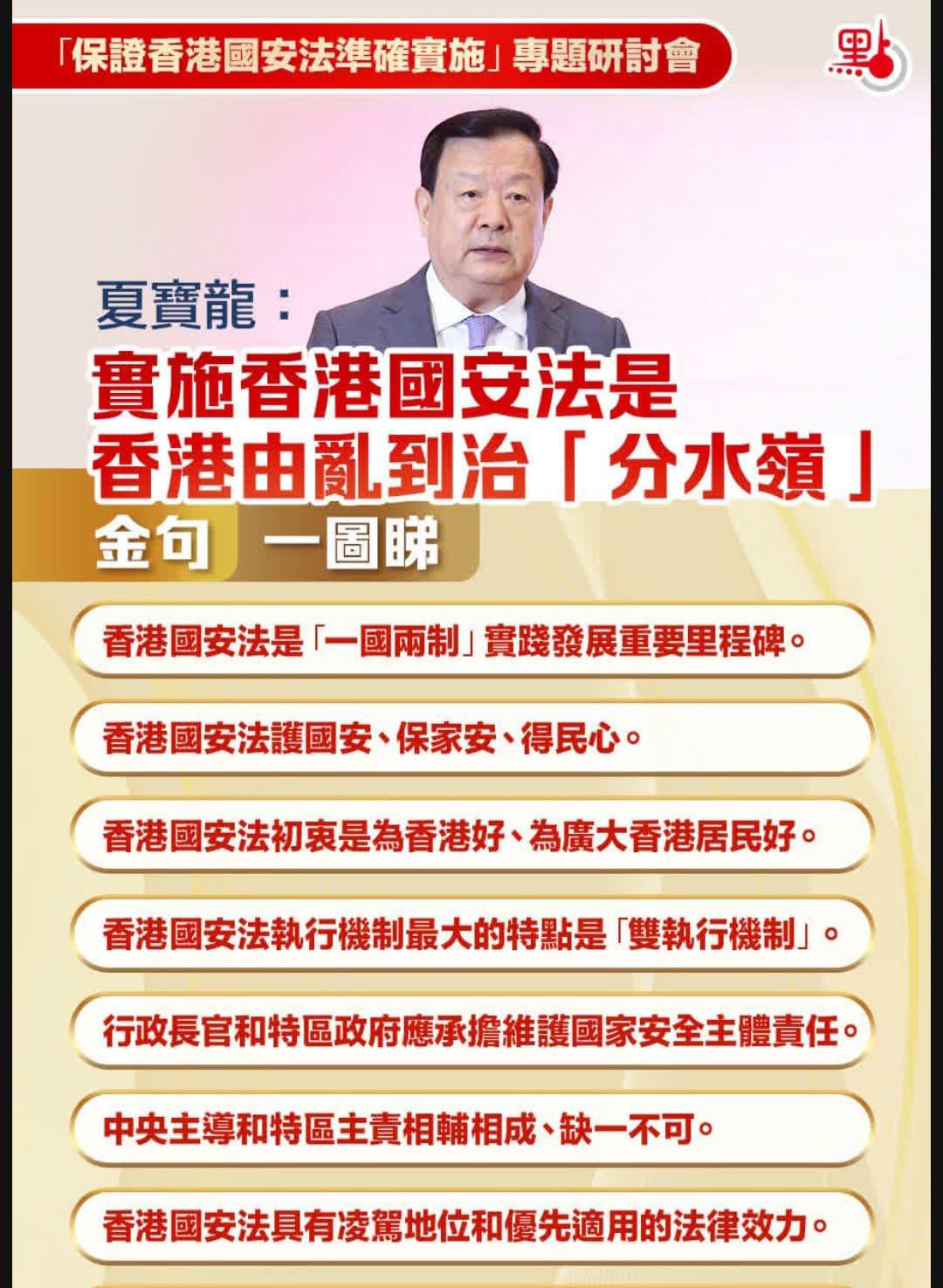特區政府發言人:前終審法院非常任法官何熙怡就《香港國安法》的言論與事實不符
*************************************
香港特別行政區(特區)政府發言人今日(七月四日)表示,前終審法院非常任法官何熙怡對《香港國安法》及有關香港法治及獨立的司法權發表的言論與事實不符,尤其她指所謂「國安法已凌駕《基本法》」這點絕不正確,有違事實。
何熙怡於二○一八年獲委任為終審法院非常任法官,但從未參予任何案件的審理。在二○二一年六月,她向司法機構表示因私人原因於當時任期屆滿後將不續任,這與其現時的說法有差異。
特區政府發言人指出,任何指稱《香港國安法》凌駕於《基本法》之上的言論均屬錯誤之談。《香港國安法》第一條開宗明義指出,全國人大常委會是根據《憲法》、《基本法》和《全國人民代表大會關於建立健全香港特別行政區維護國家安全的法律制度和執行機制的決定》(全國人大《5.28決定》)制定。《香港國安法》二○二○年六月三十日在香港特區公布實施,填補香港特區維護國家安全法律制度和執行機制的短板漏洞。《香港國安法》與其他香港特區維護國家安全的法律均堅持法治原則,同時依法保護《基本法》規定的權利和自由。
香港特區的司法制度受《基本法》保障。《基本法》第二條、第十九條及第八十五條訂明,香港特區享有獨立的司法權和終審權,法院獨立進行審判,不受任何干涉。所有法官和司法人員緊守司法誓言,以無懼、無偏、無私、無欺之精神,嚴格根據法律原則,維持司法公義。法官在處理危害國家安全犯罪案件時,一如其他案件,都是獨立公正地履行司法職責,不受任何干涉。五年來的實踐證明,法院嚴格按照上述原則處理涉及《香港國安法》的案件。
全國人大常委會解釋《基本法》及在香港特區實行的全國性法律的權力,是「一國兩制」原則下的重要一環,並早已在香港特區的法理中確立。作為一部全國性法律,《香港國安法》第六十五條規定該法的一般解釋權屬全國人大常委會,完全符合「一國兩制」原則。全國人大常委會二○二二年十二月就《香港國安法》第十四條和第四十七條作出的解釋,並不也沒有直接處理具體司法程序或案件,而是釐清有關法律規定的含義和適用法律的依據,絕不存在損害香港法院受《基本法》保障的獨立審判權和終審權的問題。有關的具體案件和爭議,最終交由香港特區自行解決。
長期以來,包括在《香港國安法》制定後,具聲望的海外法官願意出任或續任香港特區終審法院非常任法官,參與終審法院審判,為本港國際化法律環境及香港普通法的法理發展作出貢獻。目前,終審法院有六名分別來自英國、澳洲和新西蘭的非常任法官。
完
2025年7月4日(星期五)
香港時間17時20分
特區政府:前終院非常任法官何熙怡就《香港國安法》的言論與事實不符 尤其她指所謂「國安法已凌駕《基本法》」這點絕不正確
極速神驅
35 回覆
2 Like
46 Dislike
嬲咗
































前終審法院非常任法官何熙怡接受英國法律期刊訪問表示,港區國安法已凌駕基本法,特區政府發言人指絕不正確,批評其言論與事實不符。
何熙怡於2018年至21年獲委任為終審法院非常任法官,她接受英國一份法律期刊訪問時,提到自己不尋求續任是因為不想提出香港司法制度已崩壞。她說如今確信做法是正確,稱北京曾介入香港法院處理Tim Owen代表黎智英辯護,認為港區國安法已凌駕基本法。
特區政府發言人表示何熙怡說法有違事實,是錯誤之談,強調港區國安法堅持法治原則,依法保護基本法規定的權利和自由。而全國人大常委會釐清有關法律規定含義和依據,並沒有直接處理具體司法程序或案件,絕不存在損害香港法院的獨立審判權和終審權。
https://www.i-cable.com/%e6%96%b0%e8%81%9e%e8%b3%87%e8%a8%8a/365386/%E7%B5%82%E9%99%A2%E5%89%8D%E6%B5%B7%E5%A4%96%E6%B3%95%E5%AE%98%E7%A8%B1%E5%9C%8B%E5%AE%89%E6%B3%95%E5%B7%B2%E5%87%8C%E9%A7%95%E5%9F%BA%E6%9C%AC%E6%B3%95-%E6%B8%AF%E5%BA%9C%E7%A8%B1%E7%B5%95




認真講,人地當時唔講出口就係怕你嬲,而家講出口,一試原來真係會嬲







林定國自己講
《基本法》對香港作全面的規定,而《國安法》則專就維護國家安全這一特定事項作規定,故有學説形容《國安法》是《基本法》的特別法,基於特別法優於一般法的原則,《國安法》和《基本法》如有不一致的地方,則優先適用《國安法》。
https://www.edb.gov.hk/attachment/tc/curriculum-development/kla/pshe/national-security-education/National_Security_Education_Knowledge_Enrichment_Seminar_Series/Knowing_more_about_the_Law_Continental_Law_Common_Law_and_National_Security_Law.pdf
第9頁
《基本法》對香港作全面的規定,而《國安法》則專就維護國家安全這一特定事項作規定,故有學説形容《國安法》是《基本法》的特別法,基於特別法優於一般法的原則,《國安法》和《基本法》如有不一致的地方,則優先適用《國安法》。
https://www.edb.gov.hk/attachment/tc/curriculum-development/kla/pshe/national-security-education/National_Security_Education_Knowledge_Enrichment_Seminar_Series/Knowing_more_about_the_Law_Continental_Law_Common_Law_and_National_Security_Law.pdf
第9頁
你知我知單眼佬都知,唔洗扮喎







佢今晚上機去歐洲,比人咁樣問返轉頭就好笑
咁即係擺明凌駕左
但又唔俾人講事實



但又唔俾人講事實




咁快反駁 即係真



果然又駁咀

個發言人熟識法律過終審法院非常任法官

第二十三條
香港特別行政區應自行立法禁止任何叛國、分裂國家、煽動叛亂、顛覆中央人民政府及竊取國家機密的行為,禁止外國的政治性組織或團體在香港特別行政區進行政治活動,禁止香港特別行政區的政治性組織或團體與外國的政治性組織或團體建立聯繫。
你2020年果條國安法已經凌架咗23條啦
中共帶頭違反二十三條
香港特別行政區應自行立法禁止任何叛國、分裂國家、煽動叛亂、顛覆中央人民政府及竊取國家機密的行為,禁止外國的政治性組織或團體在香港特別行政區進行政治活動,禁止香港特別行政區的政治性組織或團體與外國的政治性組織或團體建立聯繫。
你2020年果條國安法已經凌架咗23條啦

中共帶頭違反二十三條
郝鐵川:香港國安法是基本法的特別法,在維護國家安全事務方面,香港國安法和基本法不一致的地方,則優先適用香港國安法。
http://www.takungpao.com.hk/opinion/233119/2020/0713/474145.html
特區政府係咪唔滿意郝鐵川


http://www.takungpao.com.hk/opinion/233119/2020/0713/474145.html
特區政府係咪唔滿意郝鐵川



再提就又軟對抗 

有******就說明.......
即係岩 



你小心, 哩個回應可視為煽動同假新聞
HKSAR Government spokesman: statement on HKNSL by former Court of Final Appeal non-permanent judge Brenda Hale far from truth
**********************************************************************************
A spokesman of the Hong Kong Special Administrative Region (HKSAR) Government today (July 4) said that the statement made by the former non-permanent judge of the Court of Final Appeal (CFA), Brenda Hale, on the Hong Kong National Security Law (HKNSL) and the rule of law and independent judicial power in Hong Kong is far from the truth, particularly her assertion that the so-called "the National Security Law has taken over the Basic Law" is absolutely incorrect and contrary to the facts.
Brenda Hale was appointed as a non-permanent judge of the CFA in 2018 but has never been involved in the hearing of any cases. She indicated to the Judiciary in June 2021 that, for personal reasons, she would not wish to have her appointment extended for another term upon the expiry of her then appointment, which differs from her current statement.
The HKSAR Government spokesman said that any claims that the HKNSL overrides the Basic Law are incorrect. Article 1 of the HKNSL clearly states that the Standing Committee of the National People's Congress (NPCSC) enacts the HKNSL in accordance with the Constitution, the Basic Law, and the Decision of the National People's Congress on Establishing and Improving the Legal System and Enforcement Mechanisms for Safeguarding National Security in the HKSAR. The HKNSL was promulgated and implemented in the HKSAR on June 30, 2020, which has addressed the shortcomings and plugged the loopholes in the legal system and enforcement mechanisms for safeguarding national security of the HKSAR. The HKNSL and other laws in safeguarding national security in the HKSAR firmly adhere to the principle of the rule of law while protecting the rights and freedoms enjoyed under the Basic Law in accordance with the law.
The judicial system of the HKSAR is protected by the Basic Law. According to Articles 2, 19 and 85 of the Basic Law, the HKSAR shall be vested with independent judicial power, including that of final adjudication; the courts shall exercise judicial power independently, free from any interference. All judges and judicial officers abide by the Judicial Oath and administer justice in full accordance with the law, without fear or favour, self-interest or deceit. When adjudicating cases of offences endangering national security, as in any other cases, judges remain independent and impartial in performing their judicial duties, free from any interference. The implementation of the HKNSL over the past five years has proven that the courts have handled all the cases involving the HKNSL strictly in accordance with the above principles.
The authority of the NPCSC to interpret the Basic Law and national laws that apply in the HKSAR is a fundamental aspect of the "one country, two systems" principle and has long been recognised in the jurisprudence of the HKSAR. It is therefore entirely in line with the "one country, two systems" principle that the general power to interpret the HKNSL being a piece of national law, as stipulated in Article 65 thereof, is also vested in the NPCSC. The interpretation given by the NPCSC on Articles 14 and 47 of the HKNSL in December 2022 does not and did not directly deal with any specific judicial proceedings or cases. Rather, it clarifies the meaning of the relevant legal provisions and the basis for application of the HKNSL. It does not in any way impair the independent judicial power and the power of final adjudication of the HKSAR courts as guaranteed by the Basic Law. It is for the HKSAR to resolve specific cases and issues by itself.
**********************************************************************************
A spokesman of the Hong Kong Special Administrative Region (HKSAR) Government today (July 4) said that the statement made by the former non-permanent judge of the Court of Final Appeal (CFA), Brenda Hale, on the Hong Kong National Security Law (HKNSL) and the rule of law and independent judicial power in Hong Kong is far from the truth, particularly her assertion that the so-called "the National Security Law has taken over the Basic Law" is absolutely incorrect and contrary to the facts.
Brenda Hale was appointed as a non-permanent judge of the CFA in 2018 but has never been involved in the hearing of any cases. She indicated to the Judiciary in June 2021 that, for personal reasons, she would not wish to have her appointment extended for another term upon the expiry of her then appointment, which differs from her current statement.
The HKSAR Government spokesman said that any claims that the HKNSL overrides the Basic Law are incorrect. Article 1 of the HKNSL clearly states that the Standing Committee of the National People's Congress (NPCSC) enacts the HKNSL in accordance with the Constitution, the Basic Law, and the Decision of the National People's Congress on Establishing and Improving the Legal System and Enforcement Mechanisms for Safeguarding National Security in the HKSAR. The HKNSL was promulgated and implemented in the HKSAR on June 30, 2020, which has addressed the shortcomings and plugged the loopholes in the legal system and enforcement mechanisms for safeguarding national security of the HKSAR. The HKNSL and other laws in safeguarding national security in the HKSAR firmly adhere to the principle of the rule of law while protecting the rights and freedoms enjoyed under the Basic Law in accordance with the law.
The judicial system of the HKSAR is protected by the Basic Law. According to Articles 2, 19 and 85 of the Basic Law, the HKSAR shall be vested with independent judicial power, including that of final adjudication; the courts shall exercise judicial power independently, free from any interference. All judges and judicial officers abide by the Judicial Oath and administer justice in full accordance with the law, without fear or favour, self-interest or deceit. When adjudicating cases of offences endangering national security, as in any other cases, judges remain independent and impartial in performing their judicial duties, free from any interference. The implementation of the HKNSL over the past five years has proven that the courts have handled all the cases involving the HKNSL strictly in accordance with the above principles.
The authority of the NPCSC to interpret the Basic Law and national laws that apply in the HKSAR is a fundamental aspect of the "one country, two systems" principle and has long been recognised in the jurisprudence of the HKSAR. It is therefore entirely in line with the "one country, two systems" principle that the general power to interpret the HKNSL being a piece of national law, as stipulated in Article 65 thereof, is also vested in the NPCSC. The interpretation given by the NPCSC on Articles 14 and 47 of the HKNSL in December 2022 does not and did not directly deal with any specific judicial proceedings or cases. Rather, it clarifies the meaning of the relevant legal provisions and the basis for application of the HKNSL. It does not in any way impair the independent judicial power and the power of final adjudication of the HKSAR courts as guaranteed by the Basic Law. It is for the HKSAR to resolve specific cases and issues by itself.
The long-time presence of esteemed judges from overseas appointed or reappointed as non-permanent judges of the CFA participating in hearings of the Court, as well as after the enactment of the HKNSL, has been conducive to the international legal environment and the development of the jurisprudence of common law in Hong Kong. There are currently six non-permanent judges from the United Kingdom, Australia and New Zealand in the CFA.
Ends/Friday, July 4, 2025
Issued at HKT 20:31
NNNN
Ends/Friday, July 4, 2025
Issued at HKT 20:31
NNNN
搵三萬狗去拉佢未
人地大法官睇你點人格謀殺先
人地大法官睇你點人格謀殺先
邊到不符?

夏寶龍都係話國安法具凌駕地位
